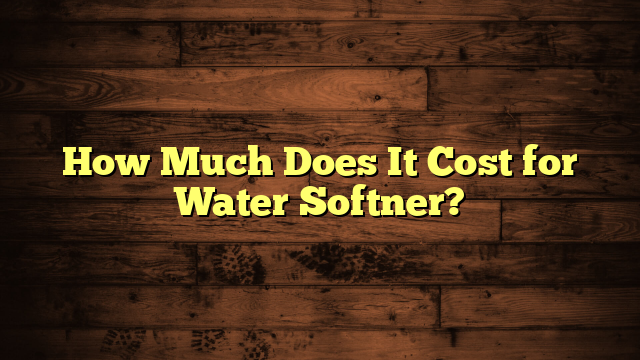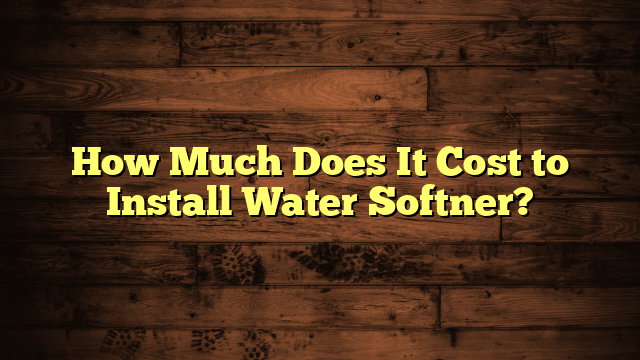How Much Does It Cost for Water Softner?
Imagine standing in your shower, feeling the difference as soft water cascades over your skin, a luxury that many homeowners desire. You might be wondering, though, what this comfort truly costs. The price of a water softener can vary greatly based on factors like type and installation fees. But before you make a decision, consider all the hidden costs and potential savings that come with this upgrade. What's the best option for your budget, and how do you weigh the benefits against the initial investment?
Key Takeaways
- The average cost of a water softener unit ranges from $400 to $2,500, depending on the type and features.
- Installation costs typically add an additional $200 to $500 to the overall expense.
- Ongoing maintenance, including salt refills and potential repairs, should be factored into long-term costs.
- Financing options are available to help manage upfront costs with payment plans.
- Long-term savings from reduced appliance wear and lower energy bills can offset initial investments.
Overview of Water Softener Costs
When you're considering a water softener, it's essential to understand the costs involved. The price of a water softener can vary widely, depending on several factors, including the size of your home and the system's efficiency.
On average, you might expect to pay between $400 and $2,500 for the unit itself, with installation costs adding another $200 to $500.
Higher-end systems often provide better water quality and efficiency, which can save you money in the long run. While it might be tempting to go for the cheapest option, investing in a quality system can greatly enhance your home's water quality.
Remember, a well-functioning water softener not only reduces mineral buildup in your plumbing but also improves the effectiveness of soaps and detergents, making your cleaning tasks easier.
Additionally, don't forget to factor in ongoing maintenance costs, such as salt refills and potential repairs.
Types of Water Softeners
Choosing the right type of water softener can make a significant difference in your home's water quality. There are mainly three types of water softeners: salt-based, salt-free, and dual-tank systems.
Salt-based softeners use ion exchange to remove hard minerals, relying on various salt types to regenerate the resin beads. This method is highly effective but does require regular maintenance and salt replenishment.
Salt-free systems, on the other hand, don't eliminate hardness but rather condition the water, preventing scale buildup. They're suitable for those who prefer a more eco-friendly option and want lower maintenance demands.
Dual-tank systems are ideal for larger households, as they guarantee a continuous supply of softened water by utilizing two tanks, allowing one to regenerate while the other is in use.
When choosing a water softener, consider the system sizes that best fit your household's needs. Smaller systems may be adequate for apartments or smaller homes, while larger systems can handle the demands of bigger families.
Understanding these types will help you select the best water softener to enhance your water quality effectively.
Purchase Price Breakdown
When considering a water softener, it's crucial to break down the total costs you'll encounter.
You'll face initial purchase prices, installation expenses, and ongoing maintenance fees that can add up quickly.
Understanding each component helps you budget effectively and make an informed decision.
Initial Purchase Costs
The initial purchase costs of a water softener can vary greatly based on several factors, including the type of system, brand, and capacity. On average, you might spend between $400 and $2,500.
For instance, traditional salt-based systems generally fall in the lower price range, while high-efficiency models or those designed for larger households can be pricier.
When considering your options, you'll want to think about the water quality in your area. Some systems are specifically designed to tackle hard water issues, so doing a quick water test can help you identify the right fit.
Brands like Culligan, Fleck, and Pentair offer various models, each with unique features and price points.
You should also check out installation guides before making a purchase. These resources will give you an idea of any additional components you might need, such as tanks or filters, which can add to your overall cost.
#
Installation Expenses
Considering installation expenses is crucial for understanding the total cost of your water softener purchase. The installation process can vary notably, so it's important to budget accordingly.
Here are some key points to reflect on:
- Professional installation vs. DIY: Hiring a professional might save you time and guarantee a proper setup, but it comes with higher costs.
- Permits and inspections: Depending on local regulations, you may need permits that can add to your expenses.
- Additional materials: Don't forget to factor in any extra materials, like pipes or fittings, that might be required.
The installation timeline typically ranges from a few hours to a full day, depending on the complexity of your system and whether you choose to do it yourself.
If you opt for professional help, be prepared for a slightly longer wait if they're busy with other projects. It's wise to get quotes from multiple installers to find the best deal without compromising quality.
Evaluating these factors guarantees you're fully prepared for the total cost of ownership when it comes to your new water softener.
Maintenance Fees
While a water softener can alleviate hard water issues, ongoing maintenance fees are vital to factor into your overall budget. These fees can vary based on the system you choose and how often you use it. Typically, maintenance frequency ranges from every six months to once a year, depending on your water quality and the model's specifications.
You'll also want to take into account the cost of salt or potassium, which is necessary for the softening process. This expense can add up, especially if you have a larger household or high water usage.
Furthermore, some homeowners opt for service contracts with professionals, which can cover routine maintenance and unexpected repairs. These contracts can provide peace of mind but come at a cost, so weigh the benefits against your budget.
Ultimately, keeping your water softener in peak condition is vital for its efficiency and longevity. By planning for these maintenance fees, you guarantee that your investment pays off in the long run, allowing you to enjoy the benefits of soft water without the surprise costs.
## Installation Expenses
When you decide to install a water softener, understanding the installation expenses is essential to your budget. The overall cost can vary greatly based on several factors, including the type of system you choose and the installation methods you opt for.
Here are some key expenses to evaluate:
- Type of Water Softener: Different systems have varying price points.
- Labor Charges: Hiring a professional can add to your costs.
- Additional Plumbing Supplies: You might need extra materials for the installation.
Typically, installation charges can range from $200 to $500, depending on your location and the complexity of the job.
If you're comfortable with DIY projects, you can save on labor charges by installing the system yourself. However, be sure you understand the installation methods involved, as improper installation can lead to costly repairs down the line.
Ultimately, budgeting for installation expenses will help you avoid surprises, ensuring that your investment in a water softener delivers the soft water you need without breaking the bank.
Ongoing Maintenance Costs
When you own a water softener, ongoing maintenance costs are an important factor to take into account.
You'll need to account for salt replacement expenses, filter changes, and routine system inspections to keep everything running smoothly.
Understanding these costs helps you budget effectively and guarantees your water softener performs at its best.
Salt Replacement Expenses
A key ongoing expense of owning a water softener is the cost of salt replacement. Depending on your water usage, you'll need to replenish the salt regularly, which can add up over time.
Here are a few factors to keep in mind:
- Type of salt: There are various types of salt—like rock salt, solar salt, and evaporated salt—that differ in price and effectiveness.
- Frequency of replacement: Depending on your household size and water hardness, you may need to replace salt every few weeks or once a month.
- Salt delivery services: Using a delivery service can save you time but may increase costs compared to purchasing salt in bulk.
Many homeowners find that bulk salt purchasing is the most cost-effective option. Buying in larger quantities not only reduces the price per bag but also minimizes trips to the store.
You might want to compare local store prices versus delivery services to determine the best option for your budget. By understanding these expenses, you can better plan for the ongoing maintenance costs associated with your water softener, ensuring you always have the right amount of salt on hand.
Filter Change Frequency
Maintaining your water softener doesn't stop at salt replacement; filter changes are another important aspect of ongoing maintenance costs. Regular filter maintenance guarantees your system runs efficiently, and neglecting it can lead to reduced performance and higher bills.
Depending on the type of water softener you have, the replacement frequency for filters can vary. Typically, you'll want to change your filters every 6 to 12 months, but consult your manufacturer's guidelines for specific recommendations.
When you replace your filters on time, you're not only protecting your system but also safeguarding the quality of your water. If you wait too long, you might face issues like clogged filters, which can lead to costly repairs or a complete system breakdown.
That's why keeping track of your filter changes is vital. To stay on top of filter maintenance, consider setting reminders on your calendar or using a maintenance log.
System Inspection Costs
Regularly inspecting your water softener is essential for guaranteeing its longevity and efficiency. By keeping an eye on its system performance, you can catch potential issues before they escalate, saving you money in the long run.
Here are some key aspects to focus on during your inspections:
- Check the salt levels regularly.
- Look for any leaks or unusual noises.
- Review the inspection checklist for all necessary components.
System inspection costs can vary based on whether you do it yourself or hire a professional. If you're tackling it on your own, you might only incur minor costs for salt and cleaning supplies.
However, if you opt for a professional service, expect to pay anywhere from $75 to $150 for a thorough check-up.
Incorporating a routine inspection into your maintenance plan not only optimizes system performance but also extends the lifespan of your water softener.
Remember to keep an inspection checklist handy, so you don't miss any important details. Regular checks can prevent costly repairs and guarantee you're getting the best quality water for your home.
Additional Features and Upgrades
When evaluating a water softener, additional features and upgrades can greatly enhance its performance and efficiency. Investing in smart technology can make a world of difference. These systems allow you to monitor your water usage and adjust settings remotely, giving you control at your fingertips.
With smart technology, you can even receive alerts on maintenance needs, helping you stay ahead of potential issues.
Energy efficiency is another vital aspect to take into account. Many modern water softeners come with built-in features that reduce salt and water consumption. Opting for a high-efficiency model not only saves you money on utilities but also minimizes your environmental footprint.
You might also want to look into advanced filtration systems that tackle specific water quality issues, like chlorine or sediment removal. Some units offer customizable settings, allowing you to tailor the softening process to your household's unique needs.
Upgrading to these additional features might require a higher initial investment, but the long-term benefits can lead to significant savings and improved water quality.
Ultimately, choosing the right enhancements guarantees your water softener performs effectively for years to come.
Cost vs. Benefits Analysis
Understanding the cost vs. benefits of a water softener is essential for making an informed decision. You need to weigh the initial investment against the long-term advantages. Here are a few key points to evaluate:
- Reduced appliance damage: Hard water can shorten the lifespan of your appliances, leading to costly repairs or replacements.
- Improved skin and hair health: Softer water can lead to noticeable benefits for your skin and hair, reducing dryness and irritation.
- Lower energy bills: Water softeners can enhance the efficiency of your water heater, which often translates into lower energy costs.
When you assess the cost benefits, you'll find that the upfront price of a water softener can be offset by savings over time. A value assessment reveals that fewer plumbing issues and longer-lasting appliances often outweigh those initial expenses.
Moreover, you'll enjoy cleaner clothes and spot-free dishes, making daily tasks easier. Ultimately, investing in a water softener isn't just about the dollar signs; it's about improving your quality of life at home.
Financing Options and Savings
Exploring financing options can make investing in a water softener more manageable for your budget. Many companies offer payment plans that allow you to spread the cost over time, helping you avoid a hefty upfront expense. These financing options can vary, so it's important to compare interest rates and terms to find the best fit for your financial situation.
Additionally, consider the long-term savings a water softener provides. Softened water can reduce wear and tear on your appliances, leading to fewer repairs and replacements. You might also notice lower energy bills since softened water requires less energy to heat. Over time, these savings can offset the initial investment, making your financing decision even more appealing.
Don't forget to look for any available rebates or incentives from local utilities or government programs. These can further lessen your financial burden and encourage you to make the switch.
Frequently Asked Questions
Can I Install a Water Softener Myself?
Yes, you can install a water softener yourself if you're handy and follow instructions carefully. Just make sure you understand the DIY installation process and keep up with regular water softener maintenance for best performance.
How Long Do Water Softeners Last?
Think of your water softener like a superhero—its lifespan typically ranges from 10 to 15 years. With regular maintenance tips, like salt checks and cleaning, you can keep your hero fighting hard against hard water!
Do Water Softeners Use a Lot of Electricity?
Water softeners typically don't use much electricity, especially modern models designed for energy efficiency. You'll find that their electricity usage remains relatively low, so you won't notice a significant impact on your utility bills.
Are There Any Health Risks With Water Softeners?
You might worry about health risks with water softeners. While they can reduce mineral buildup, they also increase sodium in your water, potentially affecting your salt intake. However, many find the health benefits outweigh this concern.
Can Water Softeners Remove Chlorine From Water?
Water softeners don't effectively remove chlorine from water. If you're concerned about water quality, consider installing a dedicated filtration system designed specifically for chlorine removal, ensuring cleaner and healthier water for your household.
Conclusion
Investing in a water softener can considerably enhance your home's water quality, reduce wear on appliances, and improve your skin and hair health. While upfront costs may seem intimidating, remember that the long-term savings and benefits can outweigh the initial expense. By understanding the various types, installation requirements, and ongoing maintenance, you can make an informed decision. So, weigh your options, explore financing, and enjoy the advantages of soft water for years to come.







